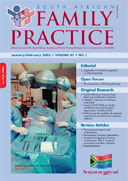The importance of life long learning.
Abstract
The concepts of evidence-based practice and clinical governance are slowly becoming commonplace in practitioners’everyday terminology. The concepts of accreditation, re-accreditation and external appraisal and validation loom in the not too distant future. However, are these terms so frighteningly divorced from the reality of standard family practice? Are practitioners life long learners by default, driven by an ability to maintain general health care? Or is life long learning something that practitioners must develop post graduation? In an attempt to answer these questions, this paper briefly discusses the historical development of life long learning and poses questions as to its applicability into daily practice. “Life well spent is long Leonardo da Vinci (SA Fam Pract 2005;47(1): 5-6)
Published
2005-02-01
Section
Forum
By submitting manuscripts to SAFP, authors of original articles are assigning copyright to the South African Academy of Family Physicians. Copyright of review articles are assigned to the Publisher, Medpharm Publications (Pty) Ltd, unless otherwise specified. Authors may use their own work after publication without written permission, provided they acknowledge the original source. Individuals and academic institutions may freely copy and distribute articles published in SAFP for educational and research purposes without obtaining permission.

